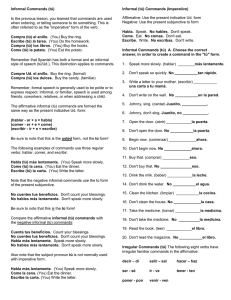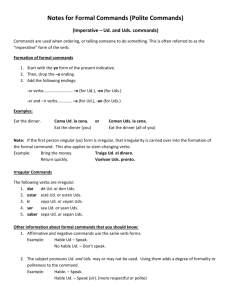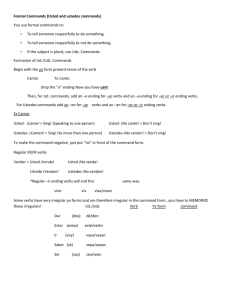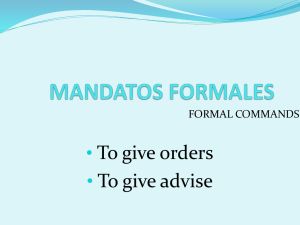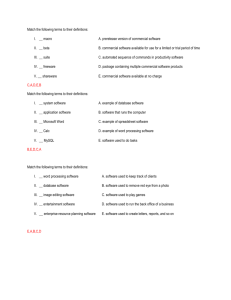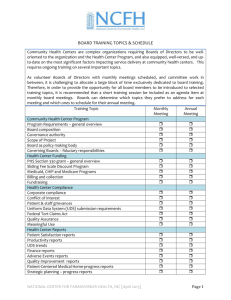Formal Commands
advertisement
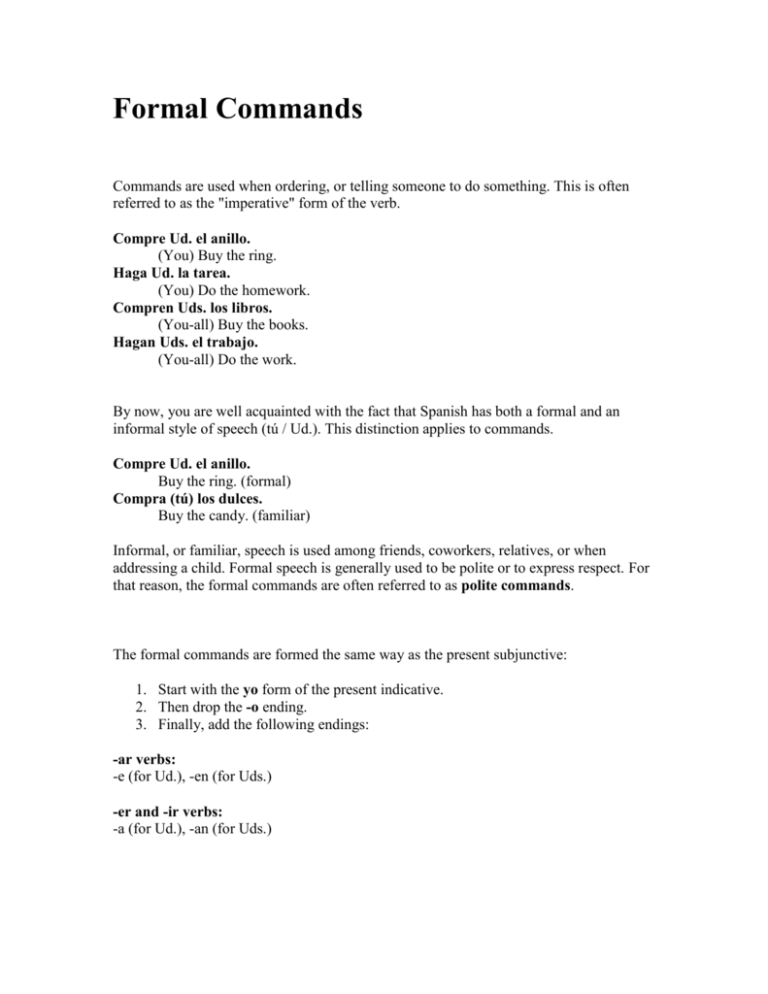
Formal Commands Commands are used when ordering, or telling someone to do something. This is often referred to as the "imperative" form of the verb. Compre Ud. el anillo. (You) Buy the ring. Haga Ud. la tarea. (You) Do the homework. Compren Uds. los libros. (You-all) Buy the books. Hagan Uds. el trabajo. (You-all) Do the work. By now, you are well acquainted with the fact that Spanish has both a formal and an informal style of speech (tú / Ud.). This distinction applies to commands. Compre Ud. el anillo. Buy the ring. (formal) Compra (tú) los dulces. Buy the candy. (familiar) Informal, or familiar, speech is used among friends, coworkers, relatives, or when addressing a child. Formal speech is generally used to be polite or to express respect. For that reason, the formal commands are often referred to as polite commands. The formal commands are formed the same way as the present subjunctive: 1. Start with the yo form of the present indicative. 2. Then drop the -o ending. 3. Finally, add the following endings: -ar verbs: -e (for Ud.), -en (for Uds.) -er and -ir verbs: -a (for Ud.), -an (for Uds.) The following examples of formal commands use three regular verbs: hablar, comer, and escribir. Hable Ud. más lentamente. Hablen Uds. más lentamente. Speak more slowly. Coma Ud. la cena. Coman Uds. la cena. Eat the dinner. Escriba Ud. la carta. Escriban Uds. la carta. Write the letter. Remember, if the first person singular (yo) form is irregular, that irregularity is carried over into the formation of the formal command. Tengan Uds. un buen viaje. (yo tengo) Have a good trip. Traiga Ud. el dinero. (yo traigo) Bring the money. Venga Ud. conmigo. (yo vengo) Come with me. This also applies to stem-changing verbs. Cuente Ud. sus beneficios. (yo cuento) Count your blessings. Vuelvan Uds. pronto. (yo vuelvo) Return quickly. Pida dinero. (yo pido) Ask for money. As with the present subjunctive, the following verbs are irregular: dar dé Ud. den Uds. estar esté Ud. estén Uds. ir vaya Ud. vayan Uds. ser sea Ud. sean Uds. saber sepa Ud. sepan Uds. Note that affirmative and negative commands use the same verb forms. Hable Ud. Speak. No hable Ud. Don't speak. Coma Ud. Eat. No coma Ud. Don't eat. Escriba Ud. Write. No escriba Ud. Don't write. Also note that the subject pronouns Ud. and Uds. may or may not be used. Using them adds a degree of formality or politeness to the command. Hable. Speak. Hable Ud. Speak (sir). (more respectful) Coma. Eat. Coma Ud. Eat (sir). (more polite) Formal Commands (Imperative) Use the present subjunctive forms Hable Ud. Speak. No hable Ud. Don't speak. Coma Ud. Eat. No coma Ud. Don't eat. Escriba Ud. Write. No escriba Ud. Don't write. Irregular Formal Commands (Imperative) Same irregulars as the present subjunctive forms dar dé Ud. den Uds. estar esté Ud. estén Uds. ir vaya Ud. vayan Uds. ser sea Ud. sean Uds. saber sepa Ud. sepan Uds Informal Commands ("tú") In the previous lesson, you learned that commands are used when ordering, or telling someone to do something. This is often referred to as the "imperative" form of the verb. Compra (tú) el anillo. (You) Buy the ring. Escribe (tú) la tarea. (You) Do the homework. Compra (tú) los libros. (You) Buy the books. Come (tú) la patata. (You) Eat the potato. Remember that Spanish has both a formal and an informal style of speech (tú/Ud.). This distinction applies to commands. Compre Ud. el anillo. Buy the ring. (formal) Compra (tú) los dulces. Buy the candy. (familiar) Remember, formal speech is generally used to be polite or to express respect. Informal, or familiar, speech is used among friends, coworkers, relatives, or when addressing a child. The affirmative informal (tú) commands are formed the same way as the present indicative Ud. form: (hablar - ar + a = habla) (comer - er + e = come) (escribir - ir + e = escribe) Be sure to note that the "tú" commands use the usted form, not the tú form! The following examples of commands use three regular verbs: hablar, comer, and escribir. Habla (tú) más lentamente. (You) Speak more slowly. Come (tú) la cena. (You) Eat the dinner. Escribe (tú) la carta. (You) Write the letter. Note that the negative informal commands use the tú form of the present subjunctive. No cuentes tus beneficios. Don't count your blessings. No hables más lentamente. Don't speak more slowly. Be sure to note that this is the tú form! Compare the affirmative informal (tú) commands with the negative informal (tú) commands: Cuenta tus beneficios. Count your blessings. No cuentes tus beneficios. Don't count your blessings. Habla más lentamente. Speak more slowly. No hables más lentamente. Don't speak more slowly. Also note that the subject pronoun tú is not normally used with imperative form. Habla más lentamente. (You) Speak more slowly. Come la cena. (You) Eat the dinner. Escribe la carta. (You) Write the letter. Informal (tú) Commands (Imperative) Affirmative: Use the present indicative Ud. form Negative: Use the present subjunctive tú form Habla. Speak. No hables. Don't speak. Come. Eat. No comas. Don't eat. Escribe. Write. No escribas. Don't write. First Person Commands ("nosotros") Nosotros commands are used when the speaker is included, and are used to express the idea "let's + verb." To form these commands, use the nosotros form of the present subjunctive. Comamos allí. Let's eat there. Contemos el dinero. Let's count the money. To form the negative command, place the word no before the same verb form (present subjunctive). No comamos allí. Let's not eat there. No contemos el dinero. Let's not count the money. The only exception is the verb ir(se), which uses the present indicative for the affirmative command only. Vamos ahora. Let's go now. but No vayamos a la tienda. Let's not go to the store. As with other commands, a written accent is often required when pronouns are added. With affirmative commands, the final "s" of the verb form is dropped before adding the pronouns "nos" or "se." Sentemos + nos = Sentémonos. Let's sit down. Escribamos + se + la = Escribámosela. Let's write it to them. But not with negative commands. No nos sentemos. Let's not sit down. No se la escribamos. Let's not write it to them. Note that "Vamos a + infinitive" can also be used to convey the meaning "Let's ___." Note the two different ways of saying the same thing. Trabajemos juntos. Let's work together. Vamos a trabajar juntos. Let's work together. Nosotros commands (let's ...). Use present subjunctive (except ir) Comamos allí. No comamos allí. Vamos ahora. No vayamos ahora.

